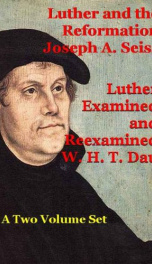Luther and the Reformation:

from the PREFACE of Luther and the Reformation:The first part of this book presents the studies of the Author in preparing a Memorial Oration delivered in the city of New York, November 10, 1883, on the four hundredth anniversary of the birth of Martin Luther. The second part presents his studies in a like preparation for certain Discourses delivered in the city of Philadelphia at the Bi-Centennial of the founding of the Commonwealth of Pennsylvania. There was no intention, in either case, to make a book, however small in size. But the utterances given on these occasions having been solicited for publication in permanent shape for common use, and the two parts being intimately related in the exhibition of the most vital springs of our religious and civil freedom, it has been concluded to print these studies entire and together in this form, in hope that the same may satisfy all such desires and serve to promote truth and righteousness.Throughout the wide earth there has been an unexampled stir with regard to the life and work of the great Reformer, and these presentations may help to show it no wild craze, but a just and rational recognition of God's wondrous providence in the constitution of our modern world.And to Him who was, and who is, and who is to come, the God of all history and grace, be the praise, the honor, and the glory, world without end!THANKSGIVING DAY, 1883 *** from the PREFACE of Luther Examined and Reexamined:One may deplore the pathetic courage which periodically heartens Catholic writers for the task of writing against Luther, but one can understand the necessity for such efforts, and, accordingly, feel a real pity for those who make them. Attacks on Luther are demanded for Catholics by the law of self-preservation. A recent Catholic writer correctly says: "There is no doubt that the religious problem to-day is still the Luther problem." "Almost every statement of those religious doctrines which are opposed to Catholic moral teaching find their authorization in the theology of Martin Luther."Rome has never acknowledged her errors nor admitted her moral defeat. The lessons of past history are wasted upon her. Rome is determined to assert to the end that she was not, and cannot be, vanquished. In the age of the Reformation, she admits, she suffered some losses, but she claims that she is fast retrieving these, while Protestantism is decadent and decaying. No opposition to her can hope to succeed.This is done to bolster up Catholic courage. The intelligent Catholic layman of the present day makes his own observations, and draws his own conclusions as to the status and the future prospect of Protestantism. Therefore, he must be invited to "acquaint himself with the lifestory of the man, whose followers can never explain away the anarchy of that immoral dogma: 'Be a sinner, and sin boldly; but believe more boldly still!' He must be shown the many hideous scenes of coarseness, vulgarity, obscenity, and degrading immorality in Martin Luther's life." When the Catholic rises from the contemplation of these scenes, it is hoped that his mind has become ironclad against Protestant argument. These attacks upon Luther are a plea pro domo, the effort of a strong man armed to keep his palace and his goods in peace.Occurring, as they do, in this year of the Four-hundredth Anniversary of the Reformation, these attacks, moreover, represent a Catholic counter-demonstration to the Protestant celebration of the Quadricentenary of Luther's Theses.
Info about the book
Author:
Series:
Unknown
ASIN:
B0008C2J9A
Rating:
4.5/5 (3)Your rating:
0/5
Languge:
English
Users who have this book
Users who want this book
What readers are saying
What do you think? Write your own comment on this book!
write a commentGenre
if you like Luther and the Reformation: try:
Other books by this author
Do you want to read a book that interests you? It’s EASY!
Create an account and send a request for reading to other users on the Webpage of the book!

